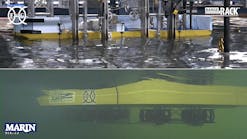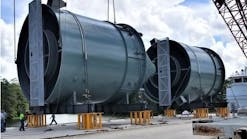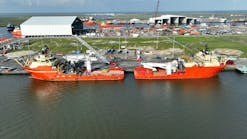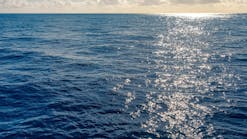Buoyant French contractors open to global business opportunities
France’s upstream/downstream contractors and suppliers are in general thriving and keen to penetrate new markets.Offshore discussed prospects with GEP chairman Dominique Michel, also vice-president of drilling engineering contractor Dietswell, and with Jean Ropers, a former Total executive and president of the government-funded R&D body, CEPM.
Offshore: Who are the current management team at GEP?
GEP president Dominique Michel.
Michel: We have younger people in place than before on our steering committee, from a variety of companies. Vice-presidents Robert Brunck, Dominique Bouvier, and Antoine Serceau are respectively the chairman of CGG Veritas, the managing director of Entrepose Contracting, and VP for projects at Total E&P. Our treasurer, Jean Chevallier, is also VP for R&D at Schlumberger in Paris.
General manager Claude Berbigier works full time for GEP. We also employ various consultants, including Claude Bouty, who is fostering links with trade groups and companies in Southeast Asia and with other regional oil and gas associations in southeast and northwest France. Among these, Pole Marine, representing marine/defense spinoff companies in the Brest/Nantes/St Nazaire area, will be exhibiting once again at GEP’s booth at OTC.
Michel Lempire is responsible for developing relations with the European Community. We also recently appointed Vladimir Jivouchkine to develop contacts in Russia - he has good links already with Gazprom.
Offshore: What other associations does GEP work closely with in France and elsewhere?
Michel: We cooperate in particular with counterpart associations in Europe such as AFTP, Eurogif, and Subsea UK, but also with the International Chamber of Commerce in Paris, the Franco-Arabian Bank, UB France, and many others.
Offshore: Is the membership still growing - are you continuing to attract companies from fringe engineering disciplines?
Michel: During the past few months, a further eight companies have joined, bringing the total membership to around 150. There has been growing interest in particular from companies in the fields of security and medical assistance.
Offshore: What kind of benefits does GEP membership provide?
Michel: We organize a club meeting every month where we try to invite companies who are not yet members to hear about GEP. Recently we have also invited clusters of companies from Venezuela and Saudi Arabia to attend.
Our members are interested in networking possibilities, exchanging ideas. Regularly, we receive delegations from national oil companies (NOCs), who are trying to find service companies to work with. We also take our own groups on missions overseas, mainly to visit the NOCs.
Offshore: Which overseas trade shows is GEP attending this year, and which are most popular with the membership?
Michel: A lot of our members have requested us to take stands at more shows. We select the ones where we are likely to attract more support. A new event for us was a technical service exhibition last month in Beijing for oil and gas products where CNOOC was in attendance.
So far this year, we have taken groups to exhibitions in Khartoum, Tripoli, Barcelona, and Teheran. After OTC, we will also be at MIOGE in Moscow, Offshore Europe in Aberdeen, and DOT in Stavanger.
Offshore: Are you conducting any special surveys or projects on behalf of your members?
Michel: Yes. One involves helping our member companies attract finance for exports and for R&D. We have also commissioned new surveys concerning standardization and biofuels. These campaigns are funded entirely by GEP.
Offshore: What are your views concerning geopolitical developments in Iran, Venezuela, Russia, and elsewhere? Are there signs of a negative impact on the activities of Total, Gaz De France, and the French contractors and suppliers?
Ropers: Our members have to work with the NOCs and other groups in these countries. What we are trying to promote is the technical competence of our companies.
Michel: When we take trade missions abroad, we try to ignore the fact that we are French, focusing instead on promoting the best technologies. We made an initial approach in Venezuela, a country where it can be difficult to make high-level contacts. That led to a Venezuelan delegation approaching us at OTC last year concerning our initial offer of assistance - their government wants to develop their offshore resources where possible, whether in 80 m or in deep waters, where they have plenty of gas. So we took a mission of seven companies to Caracas to meet representatives from PdVSA, and GEP’s counterpart there, Camera Petrolera.
Ropers: Local content is becoming more and more mandatory. Total has been active for a long while off Indonesia, Angola, and Nigeria, for instance, where understandably, there is a need now for a high local participation in all forms of activity. The French companies are very well equipped to respond to that situation, and they are accustomed to working with supposedly difficult countries and NOCs.
Offshore: What shape would you say Total is in, compared with the other four supermajors?
Ropers: For me, there is no doubt that Total compares very favorably with all of them, probably because it has gained a huge and valuable experience in non-OCDE or developing countries around the whole world. It is also to be noted that Total, like ExxonMobil, has never followed the numerous successive management fashions that have so much disturbed the independent oil world, technically and human resources wise.
The other majors have experienced various costly technical problems around the world on their large projects.
You always have to consider the environment you are working in; Total is undoubtedly well prepared for the emerging new oil world.
Offshore: How significant is Total’s new onshore carbon capture project in its Lacq field in southwest France, and which French contractors might be involved?
Ropers: Geoservices and CGGVeritas, possibly. To understand the geology and the impact on the reservoir, you need to apply 4D analytical techniques. But IFP is basically the prime mover in this field, via its acid gas treatment programs. The Total Sprex project is also of prime interest in that respect.
Offshore: How are GEP members faring with the continuing problem of skills shortages? Where are these shortages most acute, and what can GEP do to help?
Michel: During our annual meeting in Paris last October, we staged a promotion with Schlumberger to promote the benefits to students of a career in oil and gas. In fact, recruitment of engineers is less of an issue than it was; the problems are more in finding lower-level technicians, i.e. supervisors on drilling rigs.
Offshore: Now that the government has wound down funding for CEPM, what lies ahead for oil and gas R&D in France?
Ropers:CEPM has been killed off, but fortunately, we have secured an agreement from Total, IFP, CGGVeritas and others for a replacement system providing private sector money with the support (non-financial) of the French government. This will be administered by a new organization known as Citeph Programme (Concertation pour l’Innovation Technologique dans l’ Exploration et Production des Hydrocarbures) starting in January 2008.
Citeph will be an association/club operating under the auspices of GEP. It will have a few sponsors and project operators, with an R&D funding envelope of Eur20 million. That’s a quite a modest sum, but still higher than the government’s previous loan budget for CEPM of Eur15 million. Citeph participation will be open to French oil and gas operators, service companies, and institutes, but we also want to invite branches of foreign-owned companies active in France and even foreign partners. We expect Citeph to be as successful as the CEP&M in promoting the French oil related technologies.






